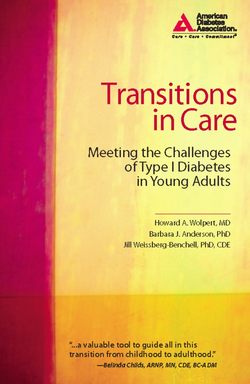Читать книгу Transitions in Care - Howard A. Wolpert - Страница 10
На сайте Литреса книга снята с продажи.
Issues That Affect the Transition of Care for Adolescents with Type 1 Diabetes
ОглавлениеThe length of time the young adult has had diabetes can be an important factor in the transition of the young adult to independent self-management. For some young adults who have had diabetes since childhood, it is important to explore formative diabetes experiences. Longitudinal studies of pediatric patients with type 1 diabetes in the U.K. and U.S. have reported that behavior problems during the adolescent years clearly predict emotional and physical health complications in the young adult period. The young adult who as a child faced unrealistic expectations for self-care behavior and glucose control and had a legacy of punitive and judgmental medical encounters is especially vulnerable to “diabetes burnout,” a condition characterized by feelings of inadequacy or guilt from chronically failing at diabetes management.
If the young adult has had a negative socialization experience growing up with diabetes and does not have a solid, constructive relationship with pediatric providers, early transfer to an adult provider (having some experience with adolescents and young adults with type 1 diabetes) may be in the patient’s best interest. One program for post-adolescent youth with type 1 diabetes was reported by Van Walleghem et al. (2006). This study assessed the feasibility and acceptability of an innovative transition service initiated to serve 18- to 30-year-old subjects with type 1 diabetes as they transitioned between pediatric and adult care in Manitoba, Canada. The “maestro” service identified and coordinated access to appropriate support services in the community for young adults with type 1 diabetes. The maestro or “health navigator” was an administrative coordinator who maintained telephone and e-mail contact with the young adults to help them identify barriers to accessing appropriate adult health care services. A comprehensive array of communication channels was established: a website; a bimonthly newsletter; drop-in, informal patient educational dinner events; and patient discussion/support groups. Over the first two and a half years of the project, 79% of eligible patients participated in the program, requesting assistance for both access to care and educational programs. In addition, results indicated that this model of service was feasible and acceptable for young adults with type 1 diabetes as they transition from pediatric to adult care.
